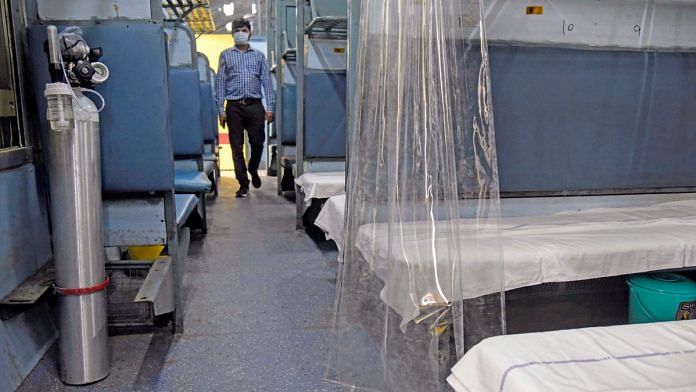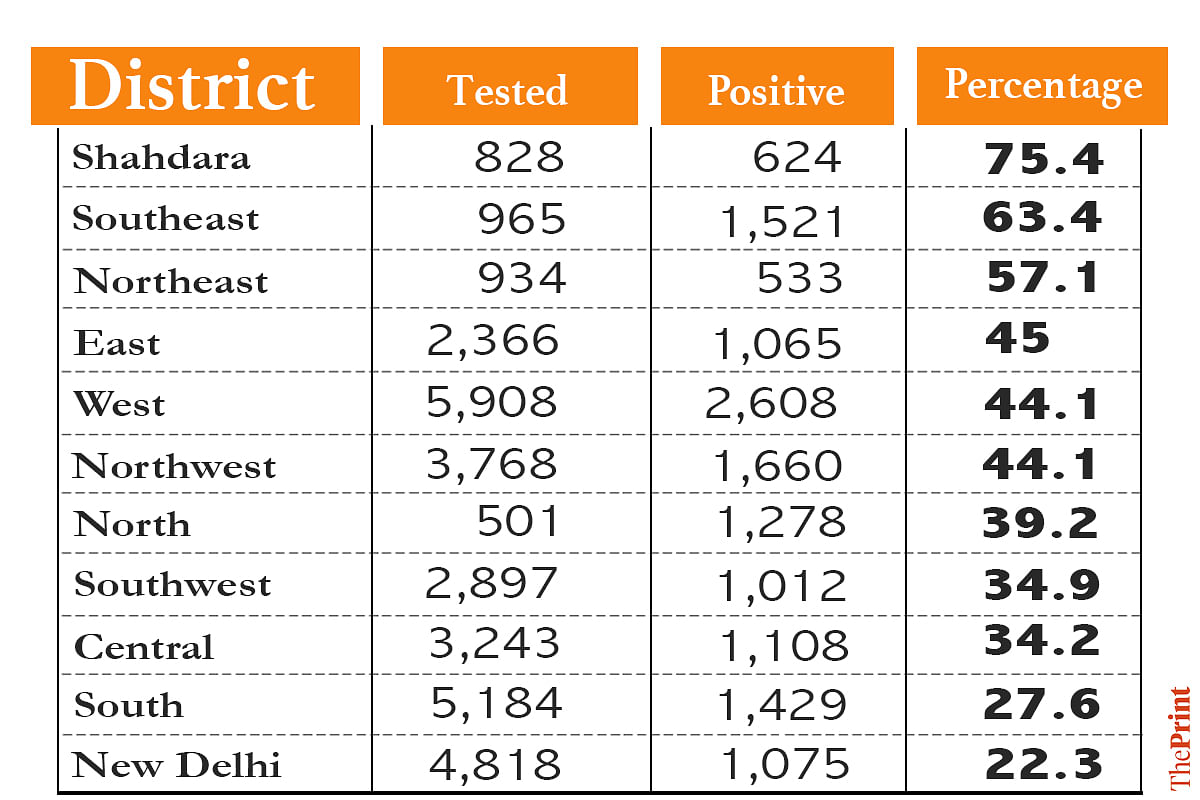New Delhi: In the last few days, Delhi has seen a dip in its Covid-19 positivity rate as the national capital ramped up its testing following Home Minister Amit Shah’s intervention on 14 June. However, the promised doubling of testing in two days is yet to happen.
The positivity rate indicates the percentage of infections in a set of tested samples. An important metric that indicates how much the infection has spread, the positivity rate is likely to be higher in samples selected through contact tracing in a containment zone. The positivity rate in a wider selection of samples would be a better indication of how prevalent the disease is, which requires increasing the number of samples tested.
On 1 June, the city had tested 4,753 samples, of which 990 were positive, about 20.8 per cent. In the following days, the daily testing numbers were in the range of 5,000-6,000 while the positivity rate rose, touching an all-time high of 36.9 per cent on 13 June.
The only exception was 8 June when just 3,700 samples were tested, of which 1,007 ( 27.2 per cent) tested positive. A slight dip in testing is not unusual over the weekend, especially Sunday.
On 14 June, however, testing numbers sharply shot up to 7,353 from 5,776 the day before, bringing the positivity rate down to 30 per cent with 2,224 samples testing positive.
Delhi, which has consistently seen Covid-19 infections rise, has been facing some criticism over its testing numbers. As of 17 June, the national capital reported 47,102 cases in total, of which 27,741 cases are active.
Also read: Delhi government issues new set of Covid-19 testing guidelines as number of cases rise
Downward trend
From then on, the daily positivity rate has been dipping, standing at 26.9 per cent on 15 June and going further down to 23 per cent on 16 June. On these days, 1,647 samples of 6,105 tested positive on 15 June while 1,859 of 7,786 were positive.
This is a significant dip from 7-13 June week. During that week, the district-wise positivity figures for Delhi had touched very high levels.
The testing figures for Wednesday (17 June) are yet to come in.
Also read: All 11 Delhi districts will now have designated Covid testing labs to reduce pendency
Amit Shah’s intervention, lab issues
On 14 June, the Union home minister met Delhi government officials, including Chief Minister Arvind Kejriwal and Lieutenant Governor Anil Baijal. In a statement released later that day, the home ministry said: “The Home Minister said COVID-19 testing will be doubled within the next two days and trebled after six days in order to check the Corona virus spread in Delhi. Besides, in the Containment Zones, testing facilities will be made available in each polling station.”
Private laboratories in Delhi were also asked to ramp up testing volumes. In a video conference held with private laboratories Monday, the country’s nodal body tackling the pandemic, the Indian Council of Medical Research (ICMR), told them to increase testing capacity significantly. However, the labs reportedly told the government there were constraints.
Speaking to ThePrint, Dr Arjun Dang, CEO, Dr Dang’s Lab, said, “To ramp up testing, you need three things — trained manpower, equipment and a BSLII (bio safety level 2) facility which needs space. That is not easy in a city like Delhi. Also manpower, if not just molecular biologists and PhDs, we also need data entry operators because the data has to be shared with multiple agencies — IDSP, ICMR and Delhi government.”
The labs are facing other issues too.
For example, one laboratory in Delhi had a Covid-19 cluster among its own staff, which seriously impeded functioning. “We have invested heavily in equipment, our capacity is 130-150, but we are doing double that. This is not just about wanting to do something. We want to serve. But a high throughput machine like the COBAS 8800 that the National Centre for Disease Control has is very expensive. Why can’t the government buy a few more of those instead of pressuring us,” said another private laboratory owner who did not want to be named.
ThePrint contacted Delhi Health Secretary Padmini Singla on the course of testing and how it would be doubling and trebling in the national capital. However, calls and messages went unanswered until the time of publishing this report.
Also read: Arvind Kejriwal has run out of excuses over his Covid failures in Delhi





What does test positivity mean? What test – rt-pcr or serologictest? Amongst what population – random or contact? Please do your homework properly before writing.